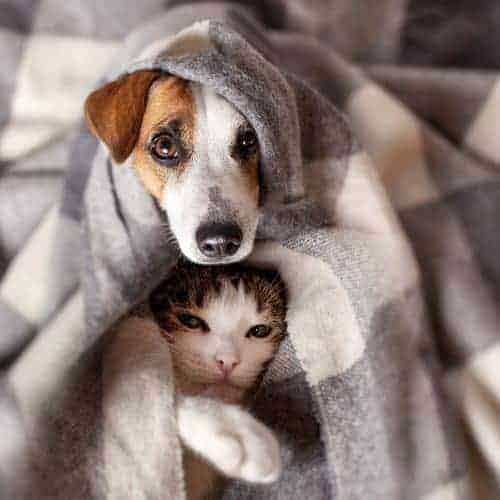
During the winter, it’s not only us humans that can feel a little under par, thanks to the range of seasonal cold and flu viruses that do the rounds. Our pets can also be susceptible to a range of unpleasant illnesses and infections.
The best way to protect our pets’ health is to ensure they have warm, dry, clean accommodation, a well-balanced, nutritious diet and that their vaccinations are up to date. Good hygiene is also important, so always wash your hands thoroughly before and after handling your pets.
Early treatment of any illness is vital – see some of the more common ones below – so if your pets show any signs that they’re not as hale and hearty as usual, contact your vet. They will be able to provide you with expert advice on the best course of treatment.
Dogs with coughs
Kennel cough is the common name given to infectious bronchitis in dogs. Just as with chest infections in humans, a number of different bacteria and viruses can cause the illness, which is highly contagious. The most obvious symptom is a hacking cough, which often sounds like your dog has something stuck in their throat. Apart from coughing, the infection is unlikely to make them feel ill. However, puppies, elderly dogs and those with existing medical conditions can be susceptible to complications such as pneumonia, which is an inflammation of the lungs, so always consult your vet. In most cases, dogs will recover without treatment within three weeks. A kennel cough vaccine is available from your vet.
Cats with flu
Cat flu is very like a human cold, causing a runny nose and eyes, a sore throat, aches and pains and sneezing, along with mouth ulcers, dribbling, loss of voice and fever. Cat flu is usually caused by one of two types of virus, or sometimes by certain types of bacteria. While not usually serious in adult cats, it can be fatal in kittens and in adult cats with underlying illnesses. Antibiotics may help because, just as with human flu, once the virus has damaged the delicate lining of the nose and airways, bacterial infections can enter and cause complications, such as pneumonia. There are lots of different strains of virus and, as with human flu, the vaccine is not effective against them all. Two doses are needed initially, followed by regular boosters. Consult your vet for details.
Bunnies with snuffles
While bunnies cannot contract a human cold, they can suffer from infections of the upper respiratory tract, causing a runny nose, runny eyes and sneezing, which is commonly called ‘snuffles’. If your rabbits are sneezing and have a whiteish discharge from their noses or eyes, take them straight to the vet. A sample of the discharge can be sent for testing, which will help your vet prescribe the safest and most effective antibiotics to treat their infection.
Guinea pigs with weepy eyes
For guinea pigs, pneumonia is a very serious condition. Symptoms include sneezing, coughing, discharge from the nose and eyes, a dull and depressed appearance and loss of appetite. Treatment will consist of alleviating the symptoms to support the body so that it can recover. Supportive therapy with fluids may be necessary in cases of dehydration due to appetite loss, oxygen therapy may be needed to help with respiratory distress, and vitamin C may be needed to help improve your guinea pig's immune system and ward off other infections. If the pneumonia is due to a bacterial infection, your vet may find it necessary to prescribe long-term antibiotics to treat it.
Chinchillas with chills
Chinchillas are very susceptible to upper respiratory tract infections, which can lead to serious complications such as pneumonia. Symptoms include sneezing, coughing, discharge from the nose and/or eyes, difficulty breathing and fever. If your chinchillas show any of these signs, consult your vet immediately so a test of the discharge can identify the bacteria causing the infection and the most appropriate antibiotic medication prescribed. To support their recovery, gently soak the nose and eyes with warm water compresses to remove any crusts that form.
Gerbils and hamsters with the sneezes
Both gerbils and hamsters can catch a cold from humans, so if you have one, don’t handle your pets. Their symptoms are similar to ours – such as sneezing and a runny nose. If one of your pets catches a cold, isolate them from the rest to stop it spreading. Keep the poorly pet in a warm room, with plenty of clean bedding. If the symptoms haven’t cleared within two or three days, visit your vet as colds can easily become something more serious, such as pneumonia.
Ferrets with stuffy noses
Just like humans, ferrets can easily catch colds and flu and suffer with similar symptoms including sneezing, coughing, runny nose and eyes, fever, wheezing, diarrhoea and loss of appetite. Make sure your ferrets drink plenty of fluid and, if they stop eating or passing faeces, take them straight to your vet. Ferrets are able to catch flu from humans so, if you’re ill, avoid handling your pets.
If you found this interesting, you may also like:
Keeping your small pets cosy in winter: Our pet rabbits, guinea pigs and ferrets need extra help during the coldest months of the year
The dangers of diagnosing your pet’s problems online: If you’re worried about your pet’s health, always consult a veterinary surgeon rather than a search engine
Why vaccinations should be a no-brainer: Dr Suzanne Moyes outlines why regular vaccinations are an essential part of caring for our vets
Sources: bluecross.org.uk, bio.miami.edu, petmd.com, wessexferretclub.co.uk














